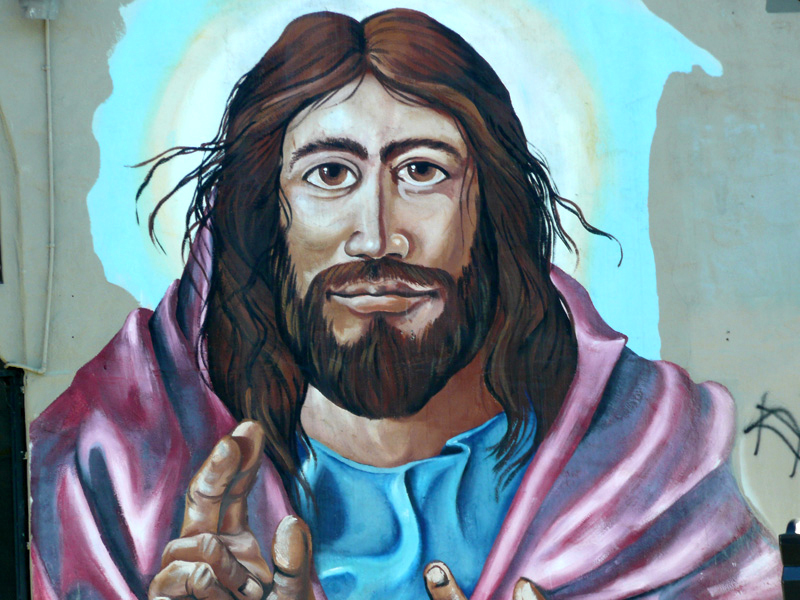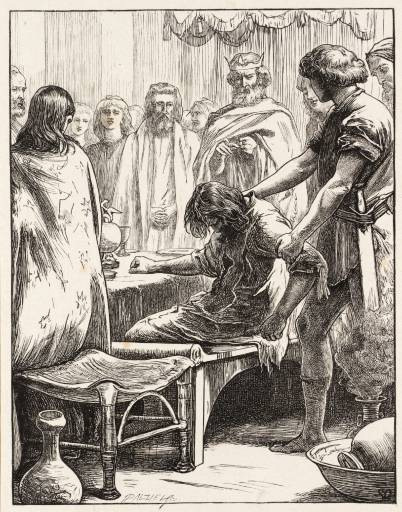Revised Common Lectionary Reflection, Nineteenth Sunday after Pentecost, Year A
October 11, 2020

Lessons: Isaiah 25:1-9; Psalm 23; Philippians 4:1-9; Matthew 22:1-14
Theme: God’s faithful and generous people avoid limiting visions of the God of the Cosmos and are willing to expand their minds and hearts to hear and see what the Christ is up to in their contexts.
Key Scripture: “But when the king came in to see the guests, he noticed a man there who was not wearing a wedding robe, and he said to him, ‘Friend, how did you get in here without a wedding robe?’ And he was speechless. – Matthew 22:11-12
This week’s parable has always been a problematic one for me; in fact, I’ve often chosen to preach the epistle or Old Testament lesson as a way to get around what I couldn’t make sense of in Jesus’ teaching here. Instead of making this into a morality play or assigning typical roles that have long been taught in Christian circles, I want to offer a few points for your consideration and maybe a way of looking at this teaching in new light. Consider it this writer’s attempt at faithful and fresh stewardship of the amazing good news we share.
Context is critical when working with this parable as recounted in Matthew’s gospel. This gospel was likely written somewhere between 70-85 CE (or later according to some scholars), not long after the fall of Jerusalem and destruction of the Temple in 70 CE. This means that Matthew’s largely Jewish Christian audience was still reeling from and trying to make sense of everything. Did these events color the author’s recounting of Jesus’ ministry and teachings? It seems likely, since humans tend to see life events through the lens of their own experience and social location.
With Lectionary preaching there’s often the temptation to lift the text from its context and greater narrative. With this teaching we do so to our preaching/teaching peril because it just doesn’t make sense if we assign our usual cast of characters. Sure, we can make some excellent points about taking seriously God’s invitation into real and abundant life and about how we so often fail to take discipleship with the seriousness dictated by this parable. But if we do that, we’re still left with what to do with the capricious man/king who is so disliked and disrespected that he can’t get folks to show up for an important celebration. When his messengers finally do round up all the “unworthy” ones, even providing party clothes, the man/king confronts a guest who isn’t properly dressed and then has him bound and thrown into outer darkness. Can this man/king truly be an allegorical representation of God? I struggle with this interpretation.
Consider the larger narrative and chain of events. Jesus has ridden into Jerusalem, an unlikely king on a young donkey. He goes straight to the temple and clears out the commercialism and abuses he finds there, making room for people of all ages, abilities, and classes to enter and find healing. Institutions change about as slowly as a cruise ship makes a U-turn, so it’s no wonder the religious leadership questions his authority to do and teach as he does. Note how his teachings in chapter 21 become increasingly surreal and violent. What’s that all about, and how might it tint our interpretation of the wedding banquet teaching? What does it have to say about authority?

What if we do what Jesus so often did and flip the story on its ear? Maybe the man/king is not a representation of God but rather a stock character for all the earthly rulers and power players who act badly and take advantage of those on the margins. The man/king is incensed that people in his honor/shame culture don’t take his invitation seriously. It reflects badly on him and on his heir. So he keeps inviting the in crowd until they finally have had enough and revolt against the slaves he sends on his behalf. The angry ruler sends in his own militia to murder the murderers and sack the city. With his honor at stake he invites all the riff-raff and dregs of society, even providing proper party clothes for them so that they’ll at least look as if e they fit in.
Then there’s the one who will not conform, who will not play dress up to salve the man/king’s bruised ego and rage. What if this character represents Jesus foreshadowing his own death at the hands of the institution and power players? This “guest” does not speak or attempt to offer a defense but instead goes uncomplaining forth to meet the politically charged death that awaits him. No one speaks up for him; he is betrayed and cast out. If this is the case, Jesus’ teaching offers a strong condemnation about abuse of power and the ways of human reign and institutions in contrast to the reign of God where all are invited and welcomed into full participation.

What about verse 14 then? How does that make sense? If you follow an upside-down, topsy-turvy interpretation of this teaching then it points to the stark contrast between the “invitations” we humans receive to participate in the dominant culture of our day. Few of us will be “chosen” to be power players and bigwigs in the wiles and ways of this world, but all are invited to participate fully in God’s in-breaking reality of life abundant and eternal. It is not about insiders versus outsiders or choosing players for the best middle-school gym class team. It’s about how one non-conformist Jesus shows us a different path to real life—a life beyond the violence, hatred, power jockeying, and window dressing. And this, my friends, is good news indeed.
Note: I give thanks for the work of Paul Neuchterlein and his explication of René Girard’s mimetic theory in helping me to reframe this troublesome teaching of Jesus. I am also grateful for the writing of Debie Thomas about this parable and her willingness to explore alternate understandings of this teaching.
In Worship
What elements of worship are essential and what elements are based on our own human traditions and contexts? What do members of your worshiping community value in worship? How willing are they to explore new expressions of this ancient faith.
As more congregations move back into their sanctuaries, albeit in different ways thanks to COVID-19, we have the opportunity to explore, pray with, and ponder what really matters and what comes to us solely as the result of our human tendency to institutionalize, memorialize, and categorize everything including God.
Invite parishioners to ponder what they have found valuable about worshiping digitally and/or outside. What have they missed? What feels different to them (if you are back in your space)? What is good about this? What is sad or troubling? How can the community move forward faithfully by adapting to altered contexts and waves of change?
With Youth
Consider talking with youth about the Parable of the Wedding Banquet in terms of their own life and context. How difficult is it to defy expectations? To choose not to care about whether you wear the right brands or affiliate with the right sports teams, political parties, or social issues? How might choosing to follow Jesus put you at odds with the world’s expectations?
With Children
This week’s focus verse is Philippians 4:4 – Rejoice in the Lord always; again I will say, Rejoice.
What does it mean to rejoice? (Honor all answers.) The dictionary tells us that it means to “feel or show great joy or delight.” Paul tells us that rejoicing should be a part of being a Christian, one who follows Jesus. Do we always feel like rejoicing? No. Can you think of some times when you don’t feel like rejoicing? (Again, honor all answers.) I don’t feel like rejoicing when I’m sick or when I feel like I’m under a lot of pressure to get things done. But here’s the thing…if I don’t feel like rejoicing, I can stop, take a deep breath and count my blessings—the things for which I am thankful. Funny thing is that after counting my blessings, I usually feel ready to rejoice again. And that is a very good thing! So count your blessings every day, and get ready to do more rejoicing
Finish with a simple echo prayer and blessing.
Dear God (Dear God),
Thank you (Thank you) for loving us (for loving us). Thank you for teaching us (Thank you for teaching us) to rejoice in you to rejoice in you). Help us to trust you for enough (Help us to trust you for enough) to count our blessings (to count our blessings). Keep us from fear (Keep us from fear). Keep us hopeful (Keep us hopeful). Make us helpful (Make us helpful). Give us peace (Give us peace). Amen (Amen).
Weekly Stewardship Bulletin Insert
This week’s epistle lesson reminds us that we are not to worry about anything but to bring our concerns to God in prayer. Prayer and trusting God are important markers of faithful stewards. What concerns do you need to turn over to God?
Stewardship at Home
This week spend time reflecting on the 23rdPsalm, one of the most beloved and often-quoted piece of scripture. Consider one verse each day and how that verse is realized in your own life, perhaps spending some time journaling about it. If you are an intergenerational family, use as many modalities as possible to approach this psalm. Write your own version of the psalm. Draw a picture for each verse to make a small storybook. Write a song or a poem about how this psalm guides your life.
2017 Reflection:https://www.stewardshipoflife.org/2017/10/the-welcome-table/
2014 Reflection:https://www.stewardshipoflife.org/2014/10/come-to-the-feast/
2011 Reflection:https://www.stewardshipoflife.org/2011/10/%e2%80%9cpity-party%e2%80%9d-or-%e2%80%9cplenty-party%e2%80%9d/
Note: Reprint rights granted to congregations and other church organizations for local, nonprofit use. Just include this note: “Copyright (c) 2020, Rev. Sharron Blezard. Used by Permission.” Other uses, please inquire: thewritelife@hotmail.com.



Leave a Reply